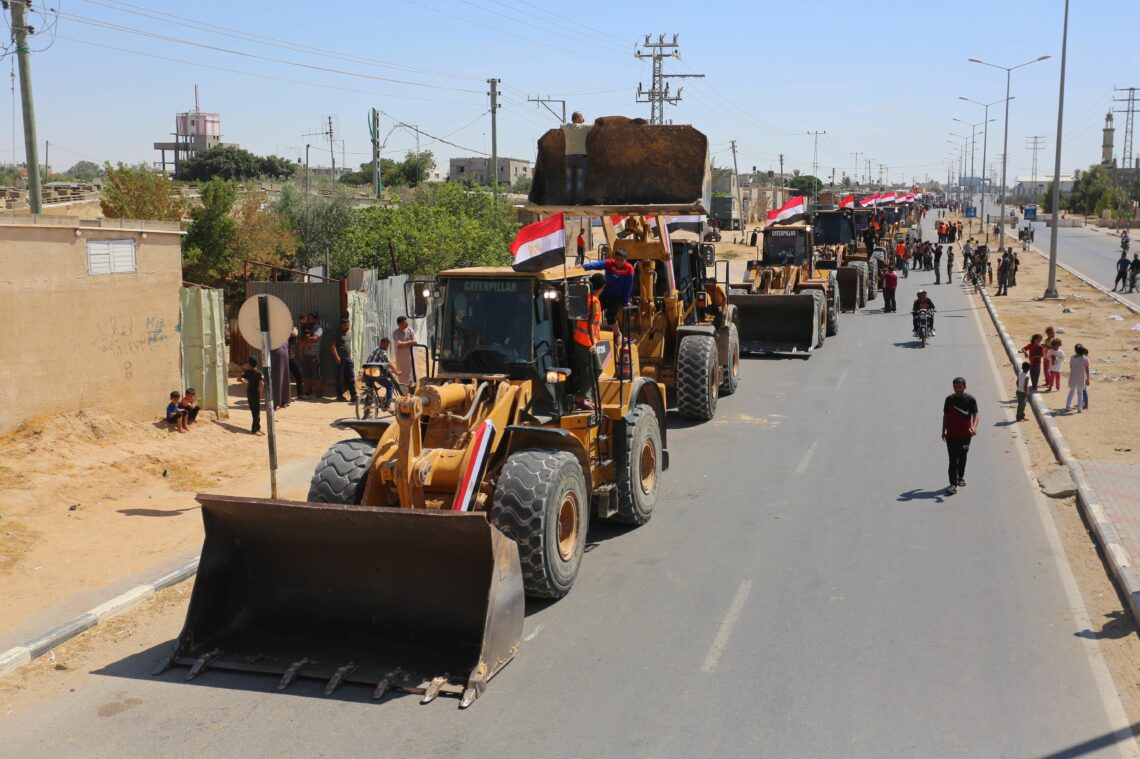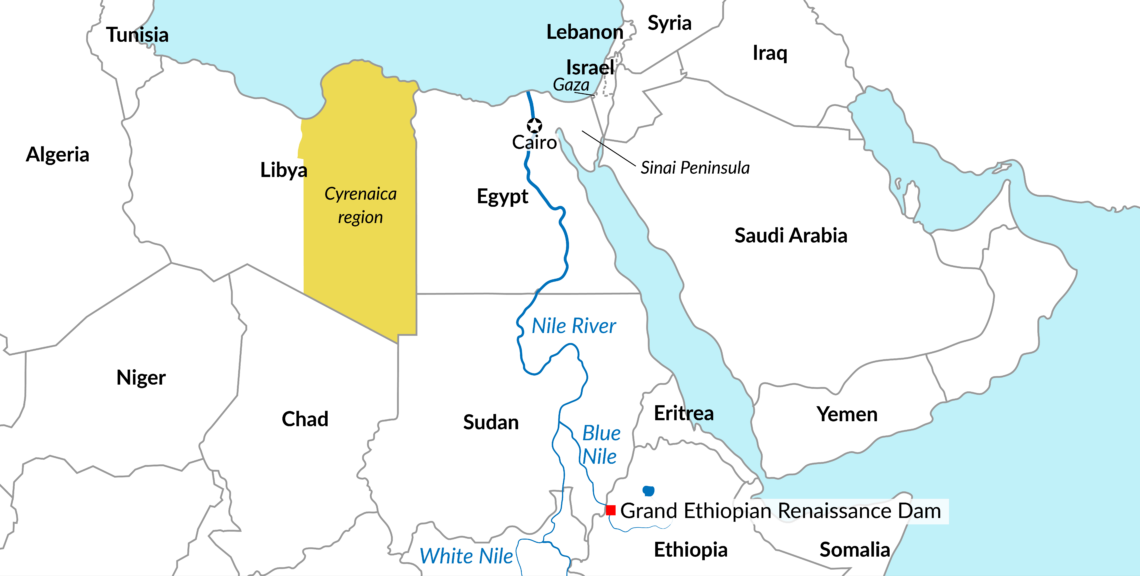Egypt emerges as the winner of the Hamas-Israel conflict
The President of Egypt is basking in the glow of international acclaim after having helped broker a cease-fire in the most recent Israel-Hamas conflict. The move seems to be part of a greater strategy to regain Egypt’s role as a regional power – and it may be working.

In a nutshell
- Egypt successfully helped halt the Israel-Hamas conflict
- It has managed to de-escalate tensions in its neighborhood
- The country could make a comeback as a regional power
Cairo has won international kudos for its skillful handling of the negotiations that brought a cease-fire in the latest round of fighting between Hamas and Israel. United States President Joe Biden made a point of recognizing Egypt’s contribution publicly; it was later revealed that he had twice called Egyptian President Abdel-Fattah El-Sisi during the conflict. Mr. El-Sisi, who had been wary of the new administration and its focus on human rights (a subject on which his country has a less than sterling record), is now basking in universal approval.
The Egyptian president pledged to contribute half a billion dollars to the reconstruction of the Gaza Strip. A few days after the cease-fire, his country’s media broadcast pictures of bulldozers, cranes and trucks bearing Egyptian flags entering the territory. Cairo is trying to show that it will once again be a player in Gaza, a move President Biden has welcomed, since he is keen to disentangle the U.S. from the region’s many difficult problems.
Simmering tensions
It may not be that simple. Israel and Hamas are yet to agree on a deal that would provide not only for the reconstruction of the Gaza Strip but also economic assistance for its population. Hamas is a radical Islamic political entity openly dedicated to the destruction of Israel. Egypt is working hard to find a compromise that could bring an extended period of calm to its northeast. There is potential for renewed fighting. Following the 2014 Protective Edge military operation, suitable arrangements had been hammered out. Israel agreed to let Qatar deliver tens of millions of dollars to Gaza every month, ostensibly to improve the lives of the people living there. It also allowed a thousand trucks to cross into the Strip every day and let Gaza exports through. Gazan fishers had access to a wide maritime zone off the coast.
Hamas took advantage of the month of Ramadan to incite protests, banking on the usual response by Israeli security forces.
But Hamas’s political aspirations were larger. Having received a setback when Palestinian President Mahmoud Abbas canceled parliamentary elections it was expected to win, Hamas fomented unrest in the territories under his control. They turned a controversial, unsettled lawsuit over the eviction of six families from their homes in East Jerusalem into a casus belli. Then they took advantage of the month of Ramadan – which brings thousands of worshipers to the city’s Al-Aqsa Mosque – to incite protests, banking on the usual response by Israeli security forces to escalate the situation. They launched seven missiles at Jerusalem as a “warning,” followed by more rockets fired at other civilian targets across the border.
These attacks led to massive Israeli strikes on the Gaza Strip. It took 11 days of intense confrontation to halt the fighting. Hamas fired more than 4,000 missiles at Israeli towns and villages. In return, the Israeli military dealt extensive damage to the organization’s assets and military infrastructure, including weapons depots, missile launchers and control centers. A portion of the 300-mile-long underground network crisscrossing Gaza, where most Hamas fighters were hiding, was destroyed. Out of the 300 people that Hamas reported killed during the fighting, 225 were its own militants, including 25 high-ranking officers.
Egypt steps in
Egypt, which has a common border both with Gaza and with Israel, intervened to stop the fighting as it had done on previous occasions. It does not want a flood of refugees trying to cross into the Sinai Peninsula. This time, however, it took on a larger role, promising economic assistance and opening the Rafah border crossing to let in the wounded it had offered to treat. Also, Qatar concluded that prolonging the confrontation would not be helpful to its allies in Gaza and pressured Hamas to halt its attacks.
Facts & figures

President El-Sisi now has the support of the U.S. in his effort to find a sustainable compromise and rebuild the Gaza Strip. The latter would be done through the United Nations, perhaps in cooperation with the Palestinian Authority – the legitimate ruler of Gaza under the Oslo Accords. Such a solution would ensure that Hamas could not receive money and equipment donated to Gaza. To that end, Egypt has invited the main Palestinian factions to negotiate in Cairo. It quickly became apparent that the differences were too big to bridge: Hamas demanded that the PA hold the parliamentary elections it had canceled. Talks were halted while Egypt and the UN try to find some common ground between the sides.
Israel announced that it would be ready to aid reconstruction efforts if Hamas set free two Israeli citizens who had crossed the border by mistake, and returned the bodies of two soldiers kidnapped and killed during the 2014 fighting. In exchange, Hamas is demanding the release of more than 1,000 of its militants held by Israel – a condition that Jerusalem cannot accept. It is not at all clear how Egypt, facing huge budget and trade deficits, could contribute half a billion dollars to Gaza while nearly a third of its own population lives below the poverty line. It is probably counting on the international community financing the work it intends to conduct with its own engineers and equipment.
The Gaza Strip was under Egyptian military rule from 1948 to 1967. Egypt never annexed the territory, and Gazans did not receive Egyptian citizenship. During that time, Egypt said that it was waiting for Gaza to become part of the Palestinian state which would be born one day. To that effect, it encouraged and even helped Gazans carry out terror attacks against Israel. During the peace talks between Egypt and Israel in 1979, Cairo refused to accept responsibility for the Gaza Strip, saying once again that it was part of the Palestinian issue and that it would be up to the Israelis and Palestinians to decide its fate.
The question is whether the presence of Egyptian workers will dissuade Gaza from attacking Israel again.
Israel, which had conquered Gaza during the Six-Day War, evacuated it completely in 2005. After Hamas took over two years later in a bloody coup, it embarked on an ambitious military program with the help of Iran, which sent arms, missiles and advanced technology. To prevent weapon smuggling, Israel imposed a land and sea blockade, a move immediately followed by Egypt, which destroyed Hamas’s contraband tunnels and closed the Rafah border checkpoint, opening it sparingly only for humanitarian cases or when pressure grew to let Gazans exit or enter the Strip. Nevertheless, weapons and ammunition are still smuggled through.
Now, the question is whether the presence of Egyptian engineers, construction workers and equipment will dissuade Gaza from attacking Israel again. After all, an Israeli reprisal could endanger those Egyptian lives and machinery. Deterring Hamas from further attacks seems to be part of Cairo’s strategy to restore its status as a Middle Eastern power.
New strategy
Egypt lost its regional standing with the onset of the Arab Spring in 2011 and the ouster of President Hosni Mubarak. In the years that followed, Egypt did its best to avoid getting involved in regional conflicts. Iran and Turkey became the major political and military players. When General El-Sisi became president, he focused on economic and financial reforms, which have brought economic growth from about 2.2 percent in 2012 to more than 5.5 percent in 2019. In 2020, despite the Covid-19 pandemic, the economy still grew by 3.6 percent, far better than many others around the world.
At the same time, President El-Sisi had his hands full with the jihadist insurrection in the Sinai Peninsula and radical Islamic terrorism, which threatened the country’s stability. He also became entangled in the civil war in Libya, backing General Khalifa Haftar, the de facto ruler of the Cyrenaica region. Worse, he had to contend with Ethiopia’s construction of the Grand Renaissance Dam on the Blue Nile. The dam could deprive Egypt of significant amounts of water, posing an existential threat to its agriculture and to the people whose livelihoods depend on it.
Tensions have decreased dramatically both inside Egypt and in its neighborhood.
Recent developments could bolster Cairo’s new strategy. After seven years of hard fighting, the Egyptian army has achieved a measure of control in the northern half of the Sinai Peninsula. With fewer terror attacks by Islamic State (also known as ISIS or Daesh), there is a return to normal life. In Libya, Egypt has been holding talks with the heads of the interim government set up as a compromise by the parties and tasked with holding parliamentary elections in December 2021. General Haftar seems ready to accept the compromise if all foreign forces leave Libya – including Syrian mercenaries brought in by Turkey, as well as Russia’s Wagner Group.
All this means that tensions have decreased dramatically both inside Egypt and in its neighborhood – except regarding the Grand Renaissance Dam, and the African Union is leading diplomatic efforts to resolve that issue as well. There is cautious optimism that a solution can be found. Egypt is also talking with Turkey and Qatar in hopes of improving relations. The countries have fallen out over Ankara’s and Doha’s support of the Muslim Brotherhood. President El-Sisi came to power after ousting former President Mohamed Morsi, a Muslim Brotherhood member, and subsequently branded the movement a terrorist organization.
Factors for instability
It is never easy to predict what could happen in the Middle East. Extremist nationalist and religious forces are at work, and Turkey and Iran are attempting to impose their own political and religious agendas on the region. There is no breakthrough regarding the Israeli-Palestinian issue, and a new round of violence between Hamas and Israel is still possible. In all this, Egypt seems to be making a genuine effort to bolster regional stability so that it can focus on improving the lives of its own citizens.
Underlying factors that Egypt cannot change remain. Islamic State has been hobbled but is still active in Syria and in Iraq. It will try to revive the Sinai insurgency. Iran is still bent on acquiring nuclear weapons. Turkey is behaving as if it wants to restore the Ottoman Empire and will keep entrenching itself in Syria while driving the Kurds away from its borders. Only time will tell if Egypt’s attempts at a new regional status will bear fruit, leaving it free to pursue economic reforms.








